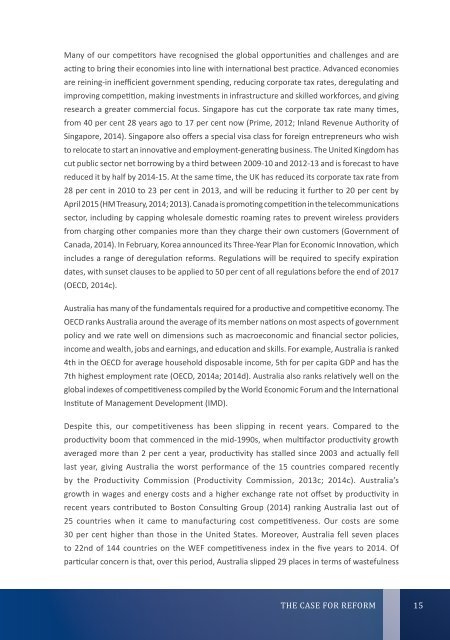Industry-Innovation-and-Competitiveness-Agenda
Industry-Innovation-and-Competitiveness-Agenda
Industry-Innovation-and-Competitiveness-Agenda
Create successful ePaper yourself
Turn your PDF publications into a flip-book with our unique Google optimized e-Paper software.
Many of our competitors have recognised the global opportunities <strong>and</strong> challenges <strong>and</strong> are<br />
acting to bring their economies into line with international best practice. Advanced economies<br />
are reining-in inefficient government spending, reducing corporate tax rates, deregulating <strong>and</strong><br />
improving competition, making investments in infrastructure <strong>and</strong> skilled workforces, <strong>and</strong> giving<br />
research a greater commercial focus. Singapore has cut the corporate tax rate many times,<br />
from 40 per cent 28 years ago to 17 per cent now (Prime, 2012; Inl<strong>and</strong> Revenue Authority of<br />
Singapore, 2014). Singapore also offers a special visa class for foreign entrepreneurs who wish<br />
to relocate to start an innovative <strong>and</strong> employment-generating business. The United Kingdom has<br />
cut public sector net borrowing by a third between 2009-10 <strong>and</strong> 2012-13 <strong>and</strong> is forecast to have<br />
reduced it by half by 2014-15. At the same time, the UK has reduced its corporate tax rate from<br />
28 per cent in 2010 to 23 per cent in 2013, <strong>and</strong> will be reducing it further to 20 per cent by<br />
April 2015 (HM Treasury, 2014; 2013). Canada is promoting competition in the telecommunications<br />
sector, including by capping wholesale domestic roaming rates to prevent wireless providers<br />
from charging other companies more than they charge their own customers (Government of<br />
Canada, 2014). In February, Korea announced its Three-Year Plan for Economic <strong>Innovation</strong>, which<br />
includes a range of deregulation reforms. Regulations will be required to specify expiration<br />
dates, with sunset clauses to be applied to 50 per cent of all regulations before the end of 2017<br />
(OECD, 2014c).<br />
Australia has many of the fundamentals required for a productive <strong>and</strong> competitive economy. The<br />
OECD ranks Australia around the average of its member nations on most aspects of government<br />
policy <strong>and</strong> we rate well on dimensions such as macroeconomic <strong>and</strong> financial sector policies,<br />
income <strong>and</strong> wealth, jobs <strong>and</strong> earnings, <strong>and</strong> education <strong>and</strong> skills. For example, Australia is ranked<br />
4th in the OECD for average household disposable income, 5th for per capita GDP <strong>and</strong> has the<br />
7th highest employment rate (OECD, 2014a; 2014d). Australia also ranks relatively well on the<br />
global indexes of competitiveness compiled by the World Economic Forum <strong>and</strong> the International<br />
Institute of Management Development (IMD).<br />
Despite this, our competitiveness has been slipping in recent years. Compared to the<br />
productivity boom that commenced in the mid-1990s, when multifactor productivity growth<br />
averaged more than 2 per cent a year, productivity has stalled since 2003 <strong>and</strong> actually fell<br />
last year, giving Australia the worst performance of the 15 countries compared recently<br />
by the Productivity Commission (Productivity Commission, 2013c; 2014c). Australia’s<br />
growth in wages <strong>and</strong> energy costs <strong>and</strong> a higher exchange rate not offset by productivity in<br />
recent years contributed to Boston Consulting Group (2014) ranking Australia last out of<br />
25 countries when it came to manufacturing cost competitiveness. Our costs are some<br />
30 per cent higher than those in the United States. Moreover, Australia fell seven places<br />
to 22nd of 144 countries on the WEF competitiveness index in the five years to 2014. Of<br />
particular concern is that, over this period, Australia slipped 29 places in terms of wastefulness<br />
<strong>Industry</strong> <strong>Innovation</strong> <strong>and</strong> <strong>Competitiveness</strong> <strong>Agenda</strong><br />
TPO00007<br />
In<br />
Co<br />
THE CASE FOR REFORM<br />
15


